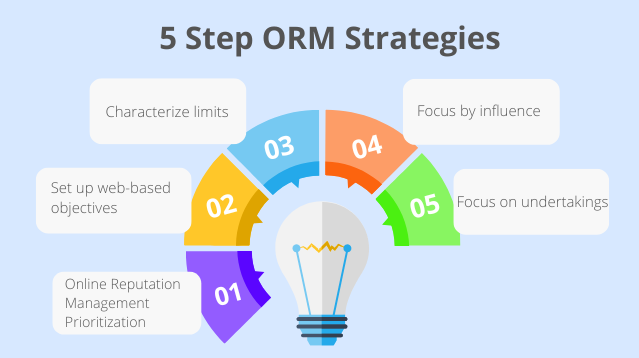Online Reputation Management - Top 5 Benefits & Strategies

Table of Contents
Elevate your online reputation with Locobuzz
Introduction
There are over 4.66 billion internet users in the world! This statement itself highlights the importance & benefits of online reputation management. Just think about the amount of pressure your brand has on its shoulders while millions more join the digital tribe. In the digital era, online brand reputation has become a crucial aspect of the business! Development of services like Social Media Chatbots, social media management tools, omnichannel solution providers, customer experience tools, etc has become the need of the hour.
The world has settled on social media platforms and other digital platforms while real life has become a mere case of survival. Brands have vastly leveraged this modern trend. They also have a lot at stake since people possess the power of creation and destruction imposable through a 6-inch screen. The public image of a brand can literally make or break a business today!. The brand image has to be maintained on various platforms, and locobuzz provides omnichannel customer engagement platforms to connect with people from different channels.
Keeping this in mind, saving your brand from the wrath of angry customers as well as fraudsters is vital. This is where Online Reputation Management (ORM) comes in. It’s not accurate to call these guys PR, but they surely ensure that your brand image stays intact while maintaining the faith of your customer base. They take the help of many online reputation management tools for this process. This works great for business retention as well as lead generation.
Key Points For Online Reputation management
- Online Reputation management is the method involved in controlling the web-based story of an individual, organization, or brand.
- It comprises reputation protection, checking, crisis management, and reputation recuperation.
- 88% of buyers carry out web-based groundwork prior to making a buy.
What is online reputation management?
Online reputation management (ORM) is a blend of public relations, digital marketing, and search engine optimization (SEO) strategies you can apply to safeguard and maintain your online image. ORM is a great way to boost positive images, news, and statements happening around you or your business online.
Online Reputation Management is the process of monitoring the online reputation of an individual or brand. This includes focusing on social media platforms like Instagram, Youtube, and Facebook, addressing potentially harmful content and using customer feedback to help solve problems before they harm the brand’s or individual’s reputation. Reputation management services is about managing product and service searches within the digital space.
Today, we’re going to emphasize four benefits of ORM service answering the question most brands have i.e. what are the benefits of doing online reputation management? Read on!
What are the benefits of online reputation management?
There are 4 major online reputation management benefits. Let’s look at each of them given below:
Keep rumors at bay

Spreading rumors about a brand is a type of black-marketing technique generally executed by competitors. There also are times when personal opinions or an isolated experience give birth to rumors.
Rumors are quickly intercepted by the market and spread in all directions with no sense of boundaries. Rumors have the potential to break a well-established brand. Keeping rumors at bay is one basic feature & also one of the benefits of ORM.
Locobuzz handles online reputation management by utilizing its own online reputation management tool to track down rumors and their sources and eradicate them ensuring the brand’s image isn’t affected.
Usually, people love to hear bad than good. Keeping a track of rumors and providing instant comeback is what ORM excels at. This keeps the Brand Image intact.
The world has settled on social media and other digital platforms while real life has become a mere case of survival. Brands have vastly leveraged this modern trend. They also have a lot at stake since people possess the power of creation and destruction imposable through a 6-inch screen.
Keeping this in mind, saving your brand from the wrath of angry customers as well as fraudsters is vital. This is where Online Reputation Management (ORM) comes in.
It’s not accurate to call these guys PR, but they surely ensure that your brand image stays intact while maintaining the faith of your customer base.
This works great for business retention as well as lead generation. But there’s more to ORM than what meets the eye. Today, we’re going to emphasize four benefits of online reputation management services. Read on!
Market credibility unharmed

It takes years to build a brand, but just a few minutes can break it completely. Ensuring that a brand isn’t affected by the happenings in the market is Online Reputation Management’s job! Marketing Credibility is actually determined by how your brand is perceived by people.
This perception can be influenced negatively, but an active ORM ensures this doesn’t happen. It helps tackle negative sentiment as well as negative comments to keep your credibility intact.
We’ve seen big brands almost lose market credibility due to the roll-out of faulty products, negative content or bad service. Online reputation management, during those circumstances, brought brands back from the gates of hell; their credibility was retained.
Complaining customers pacified

You don’t want customers venting about their negative experience with your brand across every portal available across the digital spectrum. However, nothing works as per your wants, right? There’s always going to be bad patches, just like there’ll always be angry customers.
If you are a large enterprise dealing in small goods or FMCG items, there are going to be angry customers! Such negative sentiment on digital platforms is like quicksand. It won’t let you sustain, and take you down.
However, online reputation management benefits in pacifying the customers with quick responses & apt resolutions!
Booming audience engagement

Lastly, Audience Engagement is also positively affected once you start managing your online response. People like brands that connect and ORM ensures they do! ORM is responsible for the praises and positive comments as well as the concerns and complaints.
Online reputation management helps personify the brand and makes people feel they aren’t interacting with a real person. This adds uniqueness to your brand giving you a chance to penetrate the market further.
It boosts sales

Before deciding whether to purchase a particular product or service, customers are more likely to look for it on the internet. Before they make a purchase from a specific company, they go online to read reviews to find out what others have to say about the brand, the products or the services it offers.
Online reviews that are positive for businesses are more likely to be a draw for consumers. Businesses that are viewed negatively or have lots of negative reviews do not reap huge gains and opportunities. It is the reason why companies must be striving to create good online reviews with the help of online reputation management.
Improving search engine ranking
ORM can greatly benefit a business by improving its search engine rankings.
By monitoring and managing a business’s online presence, including its website, social media profiles and customer reviews, ORM can help increase visibility and drive more traffic to a business’s website.
This, in turn, can lead to an increase in potential customers, and ultimately, a boost in revenue.
Building trust and credibility with potential customers
ORM can also play a crucial role in building trust and credibility with potential customers.
Positive reviews and a strong online presence can help attract new customers and increase brand loyalty. As a marketer, I know that a positive reputation is essential for any business to thrive in today’s digital age.
Address reviews and complains
Another important aspect of ORM is the ability to identify and address negative reviews or complaints quickly and effectively.
This can prevent any negative feedback from spreading and causing damage to the business’s reputation.
Provide Valuable insights
ORM services can also provide valuable insights and feedback that can inform important business decisions, such as product development and marketing strategies.
Top 2 Examples of Online Reputation Management
The 2 best examples of reputation management done right. Further, get to know the lessons we can draw from their success.
1. Snowbird - How they dealt with online negative reviews
Negative online reviews can harm your business unless you decide to turn them right into a digital advertising approach or strategy.
2. Nike - Support handle and timely interaction
Nike has gained a great reputation for timely and effective social media reputation management. Nike has laid out a tweet support team to address the concerns of clients promptly. The online platforms offer incredible ways to provide timely help and support to consumers. They have a devoted Team Nike support account on Twitter that responds to comments, criticism and feedback in almost real-time.
This online reputation management strategy work wonders for keeping client remarks and questions in a single spot, thus, increasing the chances of you getting back to consumers in a timely fashion.
Key Lesson: Your social media followers expect you to interact and connect with them and respond to their queries and feedback. Creating a dedicated account for that purpose will make the interaction more straightforward and lay out your business as client-centric.
On what basis one should choose online reputation management companies ?
Online Reputation Management companies offer diverse services to people and firms, such as SEO, content development, creating social media content and monitoring reviewing acquisition, management and third-party monitoring of websites. And if your branding is unique, so your reputation management plan must be as well.
When you are choosing online reputation management companies to manage your personal or business reputation, you must consider factors such as your budget and the features you’d like to have and the quality of support provided by the customer.
The first step is to evaluate your reputation’s current standing in relation to your ideal image. Are you working to repair a bad online reputation, keeping your existing one, or creating the whole new one? What platforms would you like to be assisted in managing? Perhaps, for instance, your website is in need of a redesign and your social media platform requires an upgrade, or your company requires more reviews.
After you’ve outlined the tasks you would need online reputation management companies to achieve for you, search for reliable and trustworthy companies who specialize in these areas.
Why Online Reputation Management Is Important?
80%
80% of shoppers give online surveys a similar load as verbal exchange
91%
91% of clients are bound to pick organizations with five-star evaluations
85%
85% of purchasers are less inclined to pick organizations with negative surveys
What is ORM in digital marketing ?
Online reputation management services is about monitoring and improving your online reputation. Research shows that 90% of customers check online reviews before buying any product or service. To engage potential customers, you must have a strong online presence.
Any business’s online reputation and public image can have a significant impact on its growth. Online Reputation Management (ORM), which monitors and identifies a brand’s online reputation, has become an integral part of any marketing strategy.
ORM in digital marketing helps business to establish and maintain a positive brand image online. Critical attacks on your image can be easily avoided and minimized in prominence. If any of your personal information is leaked online ORM helps remove such data from public databases, known as “people search” databases.
Establish an Online Reputation Management Strategy & Technique

Now when you know what the online landscape around your brand is, it is time to set up a reputation management strategy. However, before we get into details about it, you have to get your priorities straight.
Online reputation management Prioritization: Getting everything rolling with online standing administration can appear to be overpowering. Consequently, prioritization is of fundamental significance, as you can’t hop on each and every notice. When your review is finished, it ought to be simpler for you to focus on what you ought to zero in on first. Attempt to adjust a couple of elements that ought to influence your choice:
Set up your web-based standing administration objectives: If it is about reaction time, it is astute to zero in on stages you have direct admittance to. You can sift through your notices inside the Brand Monitoring instrument by these standards and screen those.
Characterize your limits: Review the number of assets you that can apportion for the online reputation management project. Furthermore, remember that this is a continuous interaction. So be reasonable in your evaluation.
Focus on your online reputation management by influence: Although you might feel like you need to manage everything simultaneously, be sensible about the extent of the gig. Influence is the greatest rule for your decision as you need to attempt to allot your assets into the channels with the most elevated stakes for your business.
Focus on undertakings for online reputation management: Which assignments are basic and should be tended to first? There ought to be an arrangement for dealing with basic and testing undertakings. Picking the simpler undertakings to finish initially isn’t generally the most ideal choice.
Online reputation management VS public relations
Public Relations (PR), is the act of engaging, informing and building relationships with brand’s primary audience across multiple platforms to shape and frame public perceptions of the organization.
PR firms tend to be more relationship-based, whereas online reputation management firms tend to be more technical and content-oriented. PR services are more visible and public-facing. However, online reputation management services often happens behind closed doors and is not as visible to the public. Reputation management services can be thought of as the “man behind curtain.”
Do PR and ORM agencies both work to shape public sentiment and create positive connections between the public and their clients? Absolutely YES, but both rely on a completely different set of strategies and tools to achieve those goals.
What is brand reputation management ?
Brand reputation management is the process of assessing how consumers perceive your business and taking appropriate strategic action when necessary to improve your brand’s reputation. In simple words, it is the the public’s perception of an organization or a company. Online reputation management is now about protecting and monitoring your brand’s online reputation through reviews, social media and Google.
Every customer’s experience with the brand is what determines its overall reputation. Brand online reputation management covers everything, from the quality and service of a brand to their customer relations and employee treatment.
ORM social media
ORM in social media can be a smart move by companies. Social channels are powerful tools for online reputation management because of their popularity on social media channels such as Instagram and Twitter. Social media is essential for ORM. Social media is one of the most efficient and productive channels for ORM due to its wide reach and the interactivity.
Brands can create their own social media community using simple ORM principles. Social media is a popular tool for brands to reach and engage an organically larger audience. Brands can also use various online reputation management tools for social media.
An ORM specialist will find it easier to use basic techniques to manage a crisis because of the huge reach of some of the most popular platforms online, such as Instagram, Facebook and Twitter. Also, It is much easier to manage a crisis in PR if you are able create an active online community using social media and basic ORM techniques.
Conclusion
These were the top four benefits of Online Reputation Management. There are many more, and a market leader like Locobuzz can help you explore them all. Online Reputation Management can really be a game-changer for your brand!
To enhance, ORM is an integral component of every business’s marketing, and growth plan for every business (even the ones which aren’t yet online). The public is talking about a company and are likely to continue to talk about it. The task is to set an effective online reputation management strategy that can navigate through all online discussions, offer solutions and create positive feelings.
Further, Online reputation management tools also helps business to analyze, monitor, and respond to online reviews. This tool allows you to find reviews about your business and then respond in an appropriate way to any negative sentiment your find.
FAQs | Online Reputation Management (ORM)
How does ORM helps in Branding?
Online Reputation Management aids you in improving the feedback of your company and helps to increase brand awareness and visibility. ORM adds sincerity in the communication of your brand which makes the brand more appealing to customers.
How Online Reputation Management Works?
Why you should care about your online reputation?
The Internet is our primary source for everything. People not only view the Internet as their primary source of information but they also trust what it tells them. In addition, they make choices based on the information they read on the internet. Therefore, it is necessary to maintain a reputation in order to gain consumers trust.
How long does it take for online reputation management to work?
Why Is Managing Your Business’s Online Reputation Necessary?
Internet is the primary point of entry for everything and people trust the information that is provided there. Leaving an offline as well as online mark is essential and it is important to monitor what others say about you on the internet and take the necessary measures to rectify any mistakes.
What is the overall cost of online reputation management services?
The prices for online reputation reputation management can be anywhere from a couple of hundred to a number of thousand dollars each month. It all depends on the type of work you require. Reputation management services rates are typically customized and generally works on a three, six or twelve month contract.






















